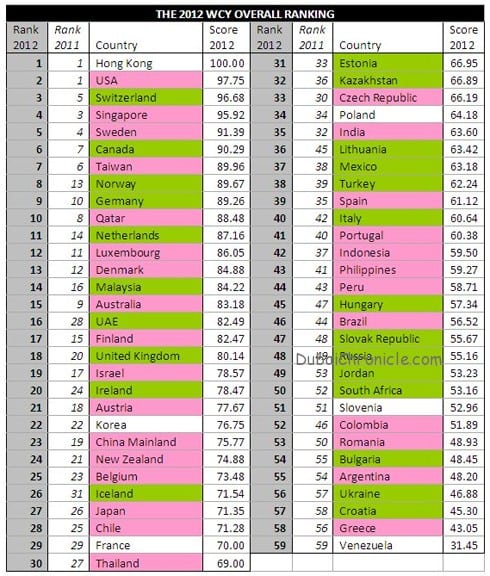Top 3 are Hong Kong, US and Switzerland
US competitiveness remains the key to global recovery
IMD today announced the findings of its annual World Competitiveness Yearbook (WCY). The WCY rankings measure how well countries manage their economic and human resources to increase their prosperity.
The most competitive of the 59 ranked economies in 2012 are Hong Kong, the US and Switzerland (see overall rankings table below). Despite all its setbacks, the US remains at the center of world competitiveness because of its unique economic power, the dynamism of its enterprises and its capacity for innovation.
“US competitiveness has a deep impact on the rest of the world because it is uniquely interacting with every economy, advanced or emerging. No other nation can exercise such a strong “pull effect” on the world. Europe is burdened with austerity and fragmented political leadership and is hardly a credible substitute, while a South-South bloc of emerging markets is still a work in progress. In the end, if the US competes, the world succeeds!” said Professor Stephane Garelli, director of IMD’s World Competitiveness Center.
The most competitive nations in Europe are Switzerland (3), Sweden (5) and Germany (9), which have export-oriented manufacturing and fiscal discipline. Meanwhile, Ireland (20), Iceland (26) and Italy (40) look better equipped to bounce back than Spain (39), Portugal (41) and Greece (58), which continue to scare investors.
Emerging economies are not yet immune to turmoil elsewhere. China (23), India (35) and Brazil (46) have all slipped in the rankings, while Russia (48) climbed only one place. All Asian economies have declined apart from Hong Kong (1), Malaysia (14) and Korea (22). Latin America also had a tough year, with every nation falling except Mexico (37).
Globalization and economic reform under threat
One-third of the 329 ranking criteria come from an exclusive IMD survey of more than 4,200 international executives, which reveals a growing skepticism in some of the 59 economies toward globalization and the need for economic reforms (see charts).
Globalization is still seen as a positive development in Ireland, Scandinavia, Chile, the UAE and many Asian economies. But attitudes are much more negative in Greece, Russia, most of Eastern Europe, a growing part of Latin America, and, last of all, in France.
Attitudes toward reforms are more positive in Ireland, emerging Asia, Qatar and the UAE, Switzerland and Sweden. But the impetus for reform is much weaker in Argentina, the Czech Republic, Spain, and lastly – again – in France, where austerity is seen as a cure worse than the disease.
“The recession has made the world economy more fragmented and diverse than ever, forcing companies to operate several parallel business models,” said Professor Garelli. “Emerging economies are relying on domestic demand and national champion companies to insulate themselves from economic turmoil, while the “submerging” developed economies are turning to re-industrialization. In both cases, economic nationalism is back and protectionism is tempting.”






























